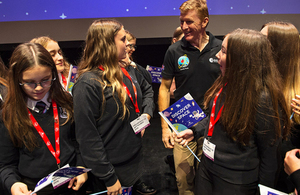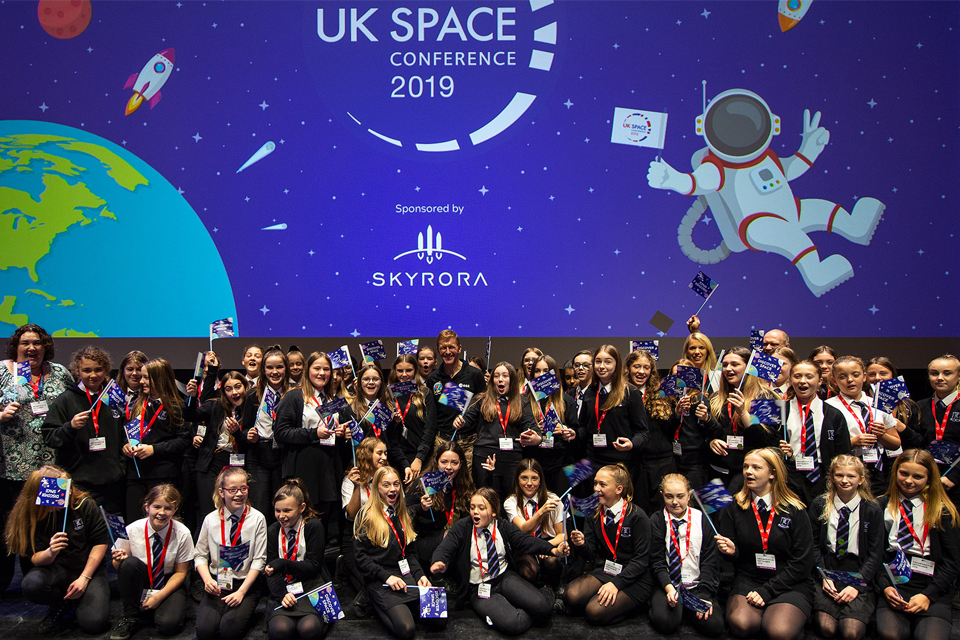Tim Peake welcomes new UK Space Agency scheme to reach 1 million children a year
The UK Space Agency has launched an initiative to help the space sector deliver a million engagement activities a year with young people across the UK.

The space sector is booming, generating billions of pounds for our economy and creating 42,000 jobs, which means there is a real need to attract more young people to careers in science, technology, engineering and mathematics (STEM).
The new programme aims to recruit more professionals to enthuse and inspire young people. The scheme will provide training and match them up with opportunities in schools and colleges
1 million young people, Part 1
British ESA astronaut Tim Peake said:
Space is a fascinating subject that has an incredible capacity to inspire. There are an enormous variety of careers available in the space sector and during my mission to the International Space Station I was part of a team of thousands of people working behind the scenes to make it possible.
As an ambassador for space careers in the UK I have seen the power of professionals sharing their experiences with young people. This scheme is a great way of helping those young people take their first steps towards an exciting career in space.

STEM Ambassadors are volunteers from a broad range of jobs and backgrounds who are passionate about inspiring young people to pursue STEM studies and careers. Working with STEM Learning, which runs both the national STEM Ambassador scheme and ESERO-UK, the UK space education office and with The Careers & Enterprise Company (CEC), which prepares and inspires young people for the fast moving world of work, the UK Space Agency is providing funding to harness the power of existing schemes that have large networks of schools and to monitor the outcomes.
The UK Space Agency is providing £125,000 to set the scheme up, and ongoing support to deliver it. The value of the in-kind support from industry is expected to be in excess of £3 million. The provision will cover all regions of the UK, all ages and attainment levels, and focus especially on under-represented groups such as girls, ethnic minorities and disadvantaged groups.
1 million young people, Part 2
Dr Graham Turnock, Chief Executive of the UK Space Agency, said:
We have been working hard to encourage a greater interest and understanding of the amazing array of careers available in space.
As we saw with the vast interest in Tim Peake’s Principia Mission, which engaged over 2 million children in the UK with education and outreach programmes, space is truly inspirational. There are more exciting missions on the horizon such as the UK-built Rosalind Franklin ExoMars rover, and this programme will deliver a huge boost to our efforts to inspire young people to follow STEM careers.
Graham Peters, Chair of the trade association UKspace, said:
The massive interest earlier this year celebrating the 50th anniversary of the Moon landings brought home the not only the huge public interest in space exploration but also how space technology plays a key role in our daily lives.
There is a renewed interest from global governments and entrepreneurs in a ‘new space age’. Space brings hugely rewarding career opportunities to work with interesting technology, to travel, collaborate with international partners, and to make a difference in areas such as climate change, securing our digital infrastructure and delivering international aid. This programme will help to inspire young people to make the subject choices that will lead them to work in a really exciting sector.
The scheme was announced at the UK Space Conference in Newport, Wales, which has run over the last three days (24-26 September) and included representatives from the European Space Agency, NASA and the Australian Space Agency.
450 local schoolchildren attended the event where they took part in day of space education activities including a tour of the Moon, handling Moon rocks, finding out about the latest UK rocket technology and a talk from Tim Peake.
They were joined by 50 “SPINterns” – undergraduates and graduates on Space Placements in Industry – who delivered pitches and presentations on topics including Forecasting Wildfires through Disruption of Navigation and Timing Signals, Designing Hybrid Rocket Engines and Studying the Atmospheric Structure of Mars.
60 teachers from primary and secondary schools also learnt about using space in the classroom during two days of teacher conferences held as part of the main conference and organised by the UK’s space education office, ESERO-UK.
For more information visit the ESERO UK website or email onemillion@stem.org.uk